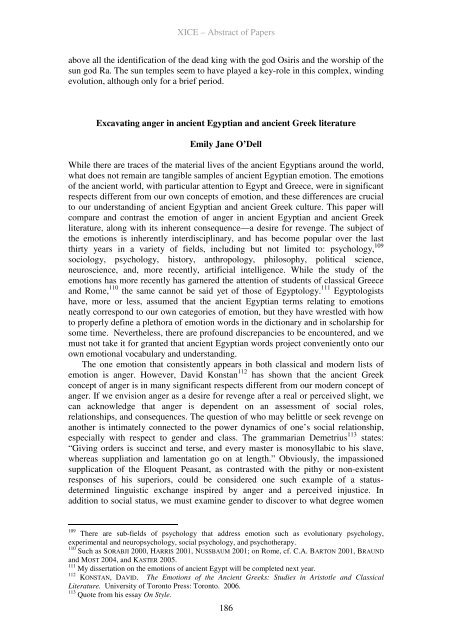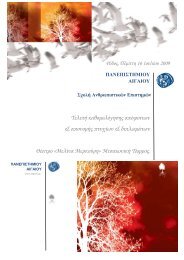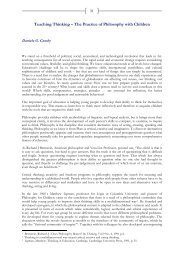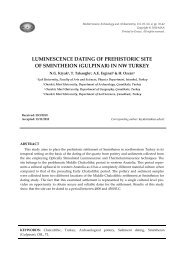Tenth International Congress of Egyptologists Abstracts of Papers
Tenth International Congress of Egyptologists Abstracts of Papers
Tenth International Congress of Egyptologists Abstracts of Papers
Create successful ePaper yourself
Turn your PDF publications into a flip-book with our unique Google optimized e-Paper software.
XICE – Abstract <strong>of</strong> <strong>Papers</strong><br />
above all the identification <strong>of</strong> the dead king with the god Osiris and the worship <strong>of</strong> the<br />
sun god Ra. The sun temples seem to have played a key-role in this complex, winding<br />
evolution, although only for a brief period.<br />
Excavating anger in ancient Egyptian and ancient Greek literature<br />
Emily Jane O’Dell<br />
While there are traces <strong>of</strong> the material lives <strong>of</strong> the ancient Egyptians around the world,<br />
what does not remain are tangible samples <strong>of</strong> ancient Egyptian emotion. The emotions<br />
<strong>of</strong> the ancient world, with particular attention to Egypt and Greece, were in significant<br />
respects different from our own concepts <strong>of</strong> emotion, and these differences are crucial<br />
to our understanding <strong>of</strong> ancient Egyptian and ancient Greek culture. This paper will<br />
compare and contrast the emotion <strong>of</strong> anger in ancient Egyptian and ancient Greek<br />
literature, along with its inherent consequence—a desire for revenge. The subject <strong>of</strong><br />
the emotions is inherently interdisciplinary, and has become popular over the last<br />
thirty years in a variety <strong>of</strong> fields, including but not limited to: psychology, 109<br />
sociology, psychology, history, anthropology, philosophy, political science,<br />
neuroscience, and, more recently, artificial intelligence. While the study <strong>of</strong> the<br />
emotions has more recently has garnered the attention <strong>of</strong> students <strong>of</strong> classical Greece<br />
and Rome, 110 the same cannot be said yet <strong>of</strong> those <strong>of</strong> Egyptology. 111 <strong>Egyptologists</strong><br />
have, more or less, assumed that the ancient Egyptian terms relating to emotions<br />
neatly correspond to our own categories <strong>of</strong> emotion, but they have wrestled with how<br />
to properly define a plethora <strong>of</strong> emotion words in the dictionary and in scholarship for<br />
some time. Nevertheless, there are pr<strong>of</strong>ound discrepancies to be encountered, and we<br />
must not take it for granted that ancient Egyptian words project conveniently onto our<br />
own emotional vocabulary and understanding.<br />
The one emotion that consistently appears in both classical and modern lists <strong>of</strong><br />
emotion is anger. However, David Konstan 112 has shown that the ancient Greek<br />
concept <strong>of</strong> anger is in many significant respects different from our modern concept <strong>of</strong><br />
anger. If we envision anger as a desire for revenge after a real or perceived slight, we<br />
can acknowledge that anger is dependent on an assessment <strong>of</strong> social roles,<br />
relationships, and consequences. The question <strong>of</strong> who may belittle or seek revenge on<br />
another is intimately connected to the power dynamics <strong>of</strong> one’s social relationship,<br />
especially with respect to gender and class. The grammarian Demetrius 113 states:<br />
“Giving orders is succinct and terse, and every master is monosyllabic to his slave,<br />
whereas suppliation and lamentation go on at length.” Obviously, the impassioned<br />
supplication <strong>of</strong> the Eloquent Peasant, as contrasted with the pithy or non-existent<br />
responses <strong>of</strong> his superiors, could be considered one such example <strong>of</strong> a statusdetermined<br />
linguistic exchange inspired by anger and a perceived injustice. In<br />
addition to social status, we must examine gender to discover to what degree women<br />
109<br />
There are sub-fields <strong>of</strong> psychology that address emotion such as evolutionary psychology,<br />
experimental and neuropsychology, social psychology, and psychotherapy.<br />
110<br />
Such as SORABJI 2000, HARRIS 2001, NUSSBAUM 2001; on Rome, cf. C.A. BARTON 2001, BRAUND<br />
and MOST 2004, and KASTER 2005.<br />
111<br />
My dissertation on the emotions <strong>of</strong> ancient Egypt will be completed next year.<br />
112<br />
KONSTAN, DAVID. The Emotions <strong>of</strong> the Ancient Greeks: Studies in Aristotle and Classical<br />
Literature. University <strong>of</strong> Toronto Press: Toronto. 2006.<br />
113<br />
Quote from his essay On Style.<br />
186






